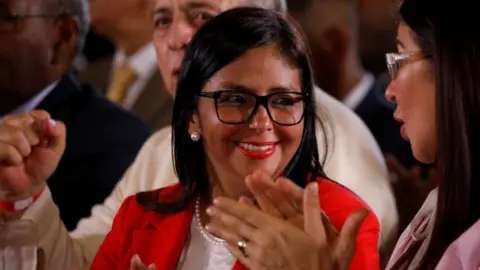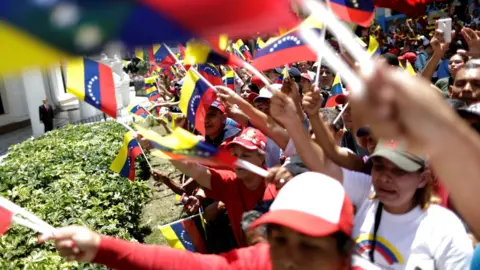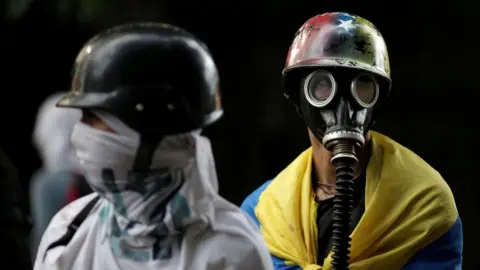Venezuela opens disputed new constituent assembly
Venezuela's controversial new assembly has opened despite fierce opposition at home and abroad.
President Nicolás Maduro says the constituent assembly is needed to bring peace after months of crisis.
But the opposition says the new body, which has the ability to rewrite the constitution, is a way for the president to cling to power.
In the capital Caracas, police used tear gas against opposition protesters who tried to reach parliament.
Several people were injured as security forces tried to disperse a few hundred demonstrators, reports say.
In other parts of the city, thousands of government supporters gathered to cheer and wave flags as the new members took office. Some carried pictures of late leader Hugo Chávez and the independence hero Simón Bolivar.
Among those sitting for the first time in the 545-member assembly are Mr Maduro's wife and son.
A close ally of Mr Maduro, former foreign minister Delcy Rodriguez, was elected president.
Her opening speech attacked the opposition as "fascist" and warned the international community against interfering.

At the scene: A divided country
Katy Watson, BBC South America correspondent, Caracas
Despite the protests and despite the criticism both at home and abroad, the Maduro administration has refused to change tack. This constituent assembly was a "victory" for the government, even though most people see it as anything but.
While the political wrangling continues, the economy is being pushed to the brink. When we arrived in Caracas a week ago, the unofficial exchange rate was around 10,000 bolivares to the dollar. It has now nearly doubled to 19,000.
But how much worse can this country get? The feeling is that things could get worse before they get better and that the opposition will need patience.
But the international community might not sit and wait for things to improve. Mr Maduro and several of his friends are already under sanctions. There is a suggestion that the US may broaden sanctions to cover the oil industry but that would be a very unpopular move. With the country relying on oil for more than 95% of its foreign earnings, the fall-out would hurt the people more than the politicians.

What is the new body - and why is it so controversial?
Constituent assemblies are set up for the specific purpose of drafting or adopting a constitution, and as such can fundamentally change how a country is run.
Venezuela is mired in a deep economic crisis and has seen waves of violent protests, and Mr Maduro presented the assembly as a way of promoting "reconciliation and peace".
 Reuters
ReutersMs Rodriguez added in her speech: "The international community should not make a mistake over Venezuela. The message is clear, very clear: we Venezuelans will resolve our conflict, our crisis without any form of foreign interference."
But the opposition has cried foul. The new assembly has the power to bypass and even dissolve the current opposition-led National Assembly.
The two bodies are expected to run in parallel in the Legislative Palace in Caracas.
How widely is it supported?
The election for the constituent assembly was marred by violence and accusations of fraud.
Venezuela's electoral authorities said more than eight million people, or 41.5% of the electorate, had voted, a figure the company that provided the voting system said was inflated.
 Reuters
ReutersThe opposition boycotted the poll and also held an unofficial referendum in which they said more than seven million Venezuelans voted against the constituent assembly.
They have called for mass protests against the new body but demonstrations so far appear to have been muted.
How does the international community see it?
The Vatican has joined worldwide condemnation of the assembly by calling for it to be suspended. In a statement, it argued the assembly fomented a "climate of tension" rather than reconciliation and peace.
The US has imposed sanctions on Mr Maduro, with the Trump administration calling him a "dictator".
 Reuters
ReutersThe European Union and major Latin American nations say they will not recognise the new body.
Mr Maduro retains a major ally in Russia, however, and has the support of several left-wing nations in the Americas.
